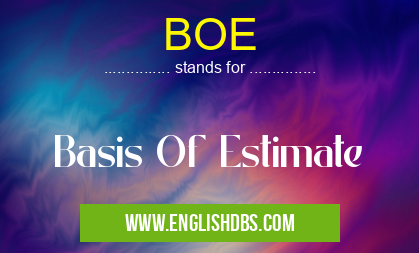What does BOE mean in LOGISTICS
Basis of Estimate (BOE) is a crucial concept in the field of estimation and project management. It refers to the underlying assumptions, data, and methodologies used to develop an estimate. A well-defined BOE ensures transparency and credibility of the estimate.

BOE meaning in Logistics in Business
BOE mostly used in an acronym Logistics in Category Business that means Basis Of Estimate
Shorthand: BOE,
Full Form: Basis Of Estimate
For more information of "Basis Of Estimate", see the section below.
What is BOE
BOE provides a clear understanding of the process and factors considered in arriving at an estimate. It outlines the:
- Assumptions: Critical assumptions made regarding project scope, market conditions, and other factors.
- Data Sources: The sources of information and data used in the estimation process.
- Methodologies: The specific techniques employed to calculate the estimate, such as parametric, analogical, or bottom-up approaches.
Importance of BOE
A clear and comprehensive BOE is essential for several reasons:
- Transparency: It allows stakeholders to understand the rationale behind the estimate and identify any potential weaknesses.
- Credibility: A well-documented BOE enhances the credibility of the estimate, as it demonstrates that it is based on sound principles and data.
- Risk Identification: By outlining the assumptions and data sources, the BOE helps identify potential risks and uncertainties that may impact the estimate.
- Decision-Making: It provides decision-makers with a clear basis for evaluating and comparing estimates from different sources.
Essential Questions and Answers on Basis Of Estimate in "BUSINESS»LOGISTICS"
What is a Basis of Estimate (BOE)?
A Basis of Estimate (BOE) is a document that provides a detailed explanation of the assumptions, data, and calculations used to develop an estimate. It serves as a record of the rationale behind the estimated costs or project scope and can be used to verify the accuracy and credibility of the estimate.
What is the purpose of a BOE?
The purpose of a BOE is to:
- Provide a clear understanding of how the estimate was developed
- Support the estimate's validity and reliability
- Facilitate communication and understanding between stakeholders
- Allow for the review and audit of the estimate's assumptions and calculations
What should be included in a BOE?
A BOE should typically include the following information:
- Project scope and description
- Assumptions made about costs, schedule, and resources
- Data sources used to support the estimate
- Calculations and methodologies used to derive the estimate
- Risk factors and contingency plans
- Any other relevant information that supports the estimate
Who is responsible for developing a BOE?
The responsibility for developing a BOE typically falls on the individual or team responsible for developing the estimate. This may include estimators, project managers, or financial analysts.
When should a BOE be prepared?
A BOE should be prepared as early as possible in the project planning process. It is most useful when used as a tool to develop the estimate and communicate it to stakeholders.
How can a BOE be used to improve project outcomes?
By providing a clear understanding of the basis for the estimate, a BOE can help:
- Improve communication and understanding between stakeholders
- Identify and mitigate risks
- Ensure that the estimate is realistic and achievable
- Facilitate project planning and decision-making
Final Words: Basis of Estimate (BOE) is a fundamental aspect of estimation that establishes the foundation for accurate and reliable estimates. By providing transparency, credibility, risk identification, and decision-making support, a well-defined BOE ensures that estimates are grounded in sound assumptions and data. It is an essential tool for effective project management and decision-making in various business settings.
BOE also stands for: |
|
| All stands for BOE |
